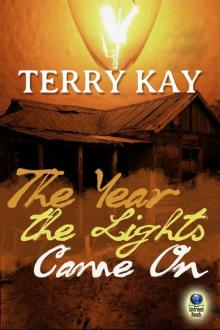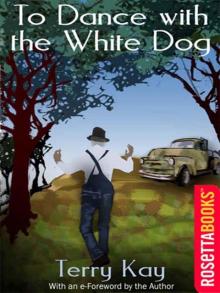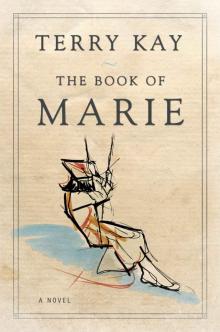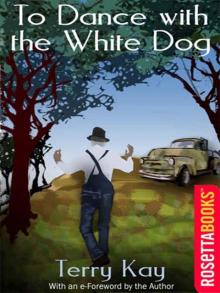After Eli Read online
Page 17
The crowd of men stood motionless. They were spectators to a dangerous sport and they knew it. They knew also they were jurors to an open court, hearing arguments of an awful illusion or an awful truth.
“Against his will, is it?” Michael said in a strong voice. “Now that’s a hard thing to say, considerin’ the circumstances. But if you think it, I’d say we put it to Owen. How would that suit, Mr. Benton? Bring Owen out and ask him about it. If he’s bein’ held against his will, let him say it straight. How would that be?”
Frank turned slowly to Michael. He held the shotgun like a stick in his right hand. His lips trembled.
“I mean it,” Michael added, walking slowly toward Frank. “Put it out in the open, before all these people. Let it be said, so there’s no doubtin’ it in anybody’s mind.” He stopped a few feet from Frank and stared deep into his confused face. “Sheriff,” he called without moving his eyes, “bring him out. Nothin’ll happen to him. Mr. Benton’s not here for killin’.” His voice softened. “Are you now, Mr. Benton?” he asked. “You’re not here for killin’?”
Frank shook his head.
“I just come for my boy,” he answered weakly.
“Bring him out, Sheriff,” Michael said. His eyes covered Frank Benton’s face like a target, narrowing on an unguarded pinspot of fear in Frank’s confused mind.
Curtis lowered his pistol and backed into the doorway of the jail. He stood for a moment watching the frozen confrontation between Michael and Frank, and he realized that he was in awe of the Irishman. If there had been any threat in Frank, the Irishman had removed it as cleanly as an amputation, leaving Frank to stand dumb and harmless before him.
Curtis turned and walked to the storeroom and opened the door. Owen was sitting on the floor in the corner of the room.
“Owen,” he said, “you heard what’s goin’ on?”
“Some,” Owen replied. “Can’t make out everythin’ bein’ said through the walls.”
“Your daddy said we was holdin’ you against your will. Said you was ready to go home, but we’d put fear in you.”
“I ain’t goin’,” Owen said.
“The Irishman wants me to bring you outside so you can say it. Wants everybody watchin’ out there to know it. I think he’s right.”
“My daddy still out there?”
Curtis nodded.
“He got his gun?”
“He ain’t gonna use it,” Curtis answered. “I’ll be beside you.”
“You want me to do it?”
“I do. More’n anythin’, for the people standin’ around. There’s some out there that’d believe anythin’ and what happened to Lester and Mary ain’t easy to put out of the mind.”
Owen dropped his eyes to the pistol in Curtis’s hand and Curtis could feel his fingers twitch on the handgrip. He pushed the barrel quickly back into its holster.
“I didn’t do what my daddy said,” Owen mumbled. “I didn’t do it. I just told him me’n Lester had talked about goin’ to work in Chattanooga, since the jobs around here was scarce. Told him I could live with my uncle and send back money to help out. I didn’t do what he said.”
“I know that, Owen.”
* * *
The men who had been waiting since early morning for the return of Frank Benton began to move cautiously from the sidewalk into the street. None of them had seen Owen since he had been in jail and there was a need in them to examine him, both for the beating Frank had inflicted and for the aura of guilt or innocence they expected to see, or sense. They did not speak among themselves; they did not need to. They would look and listen and later they would decide. It was that simple and it did not matter if ballots were ever cast against Owen; nothing would sway what they saw and heard at that moment.
The screen door to the jail opened and Curtis stepped outside. His hand was poised above the butt of his holstered pistol. He stood holding open the door with his left hand, and his eyes swept across the men in the street, across Frank and Michael to Garnett Cannon.
“Doc, you got anythin’ to say about this?” he asked.
Garnett moved beside Michael. He looked at Frank and then at Shirley, huddled in the passenger seat of the car. He would never understand these people, he thought. Never.
“Bring him out,” he said.
The only sound as Owen appeared in the doorway was a high, frightened whimper from Shirley. She sank suddenly in the car seat and covered her face with her hands. The men in the street were as still as photographs as they watched Owen standing close to the sheriff—part boy, part man, quivering like some hunted and trapped thing displayed in a carnival tent.
“There’s nothin’ to be afraid of, Owen,” Michael called gently. “There’s a question you need to answer. That’s all.”
Owen did not move. His head was bowed. His arms were crossed over his chest.
“Your father says you’re bein’ held here against your own free will,” continued Michael. “Says you’ll be wantin’ to go home. Is that true? Are you wantin’ to go home?”
Owen raised his head slowly and looked at his father. His father seemed ravaged by madness. Owen shook his head and his body swayed. He muttered, “No.”
“Boy—” Frank said helplessly.
Owen stepped backward, into the sheriff. He shook his head again.
“You heard him, Frank. Go on home,” Curtis advised.
Frank looked at Owen and started to speak, but did not. He moved in a daze past Michael and Garnett to his car. He opened the door and slipped inside, placing the shotgun beside him.
“You’re doin’ the right thing,” Michael said. He walked to the car and leaned down to the window and whispered, “I’m askin’ you to think about it. When I was talkin’ to Owen he was worried that you’d start beatin’ on the little ones, like the girl there. I wouldn’t be doin’ that.”
Frank stared hard at Michael. He switched on the motor of his car and the motor roared noisily.
“Don’t be doin’ it, Mr. Benton,” Michael warned, smiling.
“Raisin’ my own’s my duty,” Frank replied nervously, pulling his eyes away from Michael.
“It is. Indeed it is,” Michael said. “But if you take the whip to the first one of them, I’ll kill you. There’ll be another cut throat. Think on that, Mr. Benton. I’ll kill you and never think a minute about it.” He smiled and winked at Frank. “I’ve done it before and I can do it again,” he added merrily.
The only person who heard Michael threaten Frank Benton was Shirley. She looked past her father into Michael’s smiling face and a great fear drove deep into her.
14
THE MEN OF YALE sat in Pullen’s Café into the night and early morning and saluted Michael’s stand before Frank Benton with their drinking and their attention and their loosened praise. But there was a giddiness, a wonder, in their words.
“He could have had his head blowed off.”
“Could have, damned right.”
“0l’ Frank looked crazy-like in the face. You see it?”
“Like he was took. Wild in the eyes.”
“Got it from his daddy, I reckon, but, by God, he wadn’t that way growin’ up. It just come on him.”
“Happened after his wife passed. I heard tell he tried to raise her, like his daddy used to try to do.”
“By God, the Irishman didn’t flinch none.”
“Not a hair.”
“Ask me, it was callin’ the boy out that done it.”
“Ain’t no question. Throwed Frank off.”
“Looked to me like Frank wanted Curtis to shoot him.”
“Curtis would’ve done it. I seen that Miller fellow after Curtis shot him. Blowed a hole in him the size of a door.”
“Boy looked like he’d been beat bad.”
“He was tellin’ the truth. He ain’t done nothin’, like the Irishman said.”
“See how the Irishman just stood there, smilin’, like it was all a big joke?”
“Looked kind
of crazy hisself, you ask me.”
Michael listened to the murmuring swirling about him, from Teague and Bailey and Job, and from men he had never before seen but who had been summoned from their homes by the air of rumor and celebration. He sat at a table against the wall, leaning back on the two rear chair legs, accepting the babble around him like an amused hero. The doctor sat close beside him and served him as an emissary who inspected the offerings of awe from the men who squeezed their way through the crowded room to acknowledge him. The doctor was tired from the weight of the day and the ungiving pressure of his years, and he had been drinking heavily. He was clinging to Michael and Michael could feel him tugging for recognition.
“It was the doc who showed nerve,” Michael said again and again, feeding Garnett’s need. “It was the doc who stepped up first and had the say.”
And Garnett waved with his hat at Michael’s words, waved with a beckoning motion that fanned the praise, like air, into his flushed face.
In the night’s frenzy Michael became certain of one thing: When he needed them—if he needed them—the doctor and the men of Pullen’s Café would listen to him and believe. When he needed them he would push his words into the fertile heat of their brains, and his words would swell and sprout and grow wild in the fields of their imaginations. They would listen to him and they would believe.
He breathed deeply of the thick room air and accepted a drink thrust into his hand by the doctor. He smiled cockily. The three women would tell him of Eli’s fortune, if he asked them. Sarah, especially. If Sarah knew. It would be that easy. Yet there was something about Owen that he could not put aside. There was a role for Owen to play in all of it. He shifted restlessly in his chair, scrubbing his shoulders into the chair back. And then a chill ran into his shoulders and up his neck and trembled in his lips.
“What’s the matter, Irishman?” Garnett asked.
“Not a thing, Doc. Not a thing.”
Michael swallowed from the whiskey. He was content.
* * *
In his bed, in the colorless night of his barn room, Michael felt the energy of Pullen’s Café seeping away in an aura of pale gray, and the ceiling above him separated ethereally in his mind into the wide mouth of a great stage. He saw the players gathered silently behind bastard flats in the dim wings, poised shyly like museum mannequins in drab costumes. Principals and walk-ons, their roles painted on their faces with dabs of rouge and thick lines of black pencil. And center stage, bowed in the cross arrows of a white light, Owen Benton waited, lifting his head in the slow mime of a final scene. A quick exhilaration, like a sweet pain, tickled across Michael’s body. The time was very near; he could sense it. He wondered where he would go when he left, what he would do. He closed his eyes and the stage in the ceiling above him faded away.
* * *
At lunch on Sunday, Michael related the story of Frank Benton to Rachel and Sarah and Dora. He told it as a bystander would tell it. He did not talk of his own role in the drama.
“It’s a sad thing to see,” he said. “Sad to see a man accuse his own flesh of such crimes. There’s stories about that Frank’s father believed he could raise the dead and there’s some kind of ghost inside Frank, like a worm inside his head, swallowin’ up his good senses.”
“I remember when his daddy was alive,” Dora said. “He started a church up in the hills, had a half-dozen families goin’ regular and there was talk about him tryin’ to raise the dead. Some said he used to use the children for a layin’ on of the hands on the dead. Frank would’ve been one of them, I guess. Seems to me, everybody moved away after Frank’s daddy died. Frank was the only one who stayed. He’s got a brother over in Chattanooga.”
“So they said,” Michael agreed. “There’s talk of sendin’ him word, so he can come for the smaller ones in the family. Seems Frank’s been beatin’ on them ever since his wife died and he couldn’t bring her back.”
“I’d heard that from Floyd,” Rachel said. “I wish somebody’d take the younger ones. But maybe it’s all over now. Maybe he’ll leave the boy alone.”
Michael nodded thoughtfully.
“Maybe,” he replied. “But I’ve got a feelin’ we’ve not seen the last of this. I’ve a feelin’ we’ve all missed seein’ somethin’ plain as day, right in front of our noses.”
“What?” asked Sarah.
“Sarah, child, I don’t know,” answered Michael. “It could be nothin’. There’s somethin’ you’d need to know about the Irish to understand what I’m sayin’. We’ve a habit of payin’ attention to our own imaginations as much as to the fact of the matter.” He pushed away from the table and stood. “Now, if you’ll be excusin’ me, I think I’ll spend some time on the fence. Way it’s goin’, Miss Dora, I’ll be retirin’ to a ripe old age before I get that wire strung.”
Dora blushed and looked away.
“Don’t work on the fence,” begged Rachel. “It’s Sunday. You’re bound to be tired. Rest.”
“Believe it or not, doin’ a little work’s what I need, Rachel. Just to shake off the cobwebs. Work’s good for makin’ a man think things out.”
He stepped to the door and turned back to the three women.
“There’s somethin’ more to happen,” he said. “I can feel it.”
* * *
In the following week the tension that had been released in Pullen’s Café began to build again and a premonition of fear rested over Yale like a gloom. Curtis stayed at the jail each day with George and into the night with Michael, guarding Owen. And when he was not with his patients, Garnett was also there, playing listless games of checkers with Curtis or George, or, late at night, walking with Michael and Owen outside the jail, by the river, to assure that Owen exercised his healing body. Curtis, Garnett, George, the townspeople who stood at their street windows—all were waiting for Frank Benton to reappear. But nothing happened, and on Saturday afternoon, a week following Frank’s challenge for Owen, Curtis drove to the Benton farm. He returned at night and called Garnett and Michael outside the jail. Frank was sitting inside his home, Curtis reported, holding a Bible in his lap, staring blankly into the fireplace.
“Expectin” some kind of sign, I reckon,” Curtis said. “He wouldn’t say nothin’ to me. The girl—Shirley—told me he’d been that way. Hadn’t said hardly a word.”
“Has he taken the whip to any of them?” asked Michael.
Curtis shook his head.
“Looked to me like he was sick,” he replied.
“Maybe I’d better go up there tomorrow and check on him,” Garnett mumbled wearily. “Could be his whole behavior’s caused by something physical. A tumor, maybe. Pressure gets on the brain, it can play havoc.”
“I’ll go with you,” Curtis said. He looked solemnly at Garnett. “You hear me, Doc,” he added quietly. “Don’t you go near that place unless I’m with you.”
Garnett laughed. He pushed his hat back off his forehead.
“It’s damn good to be worried about,” he said. “Tomorrow, then. Town’ll be closed. Won’t attract as much attention.”
Curtis nodded agreement.
“You’ll need to be here, Irishman,” Garnett added. “Hate to say it, but I don’t want to leave George alone with the boy, the way George feels.”
“I’ll be here,” Michael promised.
* * *
It was one o’clock in the morning when the sheriff left the jail. Michael stood outside in the cool August air and watched him drive away. The moon was at quarter, with its underbelly spoon of gold precariously balancing the shadowy bubble of the full globe like a cosmic trick. He could hear the monotonous swirl of the Naheela River and the night cries of night creatures. He looked down the street toward Pullen’s Café and saw Teague’s truck and, through the windows of the café, a dull light. Soon Teague would stumble out of the cafe with his friends. They would be drunk and would pile comically into the truck and roar away into the mountains, and John Pullen would close his café-tavern and slow
ly climb the outside steps of the building to his living quarters upstairs. Michael thought of John Pullen, whose entire life was linked by a set of stairs between his sleeping and working. He tried to remember the sound of John Pullen’s voice, but could not; he could not remember ever hearing John Pullen speak.
He went inside the jail and locked the heavy wooden door with its slip-bar. He walked to the cell where Owen slept on his cot. The rhythms of his body quickened and pumped through him in harmony and he knew it was time for the tragedian to awaken and accept his role.
“Owen,” he said quietly. “Owen, wake up.”
Owen stirred on the cot.
“Owen, wake up,” Michael repeated. “We need to talk.”
Owen lifted his head and peered sleepily toward Michael.
“What’s wrong?” he asked.
“Shhhhh, quietly,” Michael replied. “We need to talk.”
Owen sat on the cot, pulling his legs beneath him. He looked around the jail, confused. The only light was from a table lamp on the rolltop desk.
“What’s the matter?” he whispered.
Michael lifted his hand for silence. He removed the key from the desk and opened the steel door to the cell and pulled the chair in the cell close beside Owen’s cot. Owen watched him carefully.
“You remember when we talked before?” began Michael. “I asked for your trust. You remember that, Owen?”
“Yes,” Owen replied. “I remember it.”
“Now’s the time for it. Do you still mean it?”
“Yes.”
“There’s talk,” Michael said.
“Talk? What kind of talk?”
“About a trial.”
Owen’s face opened in fear.
“It’s bein’ kept quiet,” Michael added quickly. “Nobody knows about it but the sheriff and the doctor and me. The sheriff went up to talk to your father. Seems there’s somebody—I don’t know his name—claimin’ he saw you up near that farm the day that young couple was murdered.”

 The Year the Lights Came On
The Year the Lights Came On To Dance With the White Dog
To Dance With the White Dog The Book of Marie
The Book of Marie After Eli
After Eli To Dance with the White Dog: A Novel of Life, Loss, Mystery and Hope (RosettaBooks into Film)
To Dance with the White Dog: A Novel of Life, Loss, Mystery and Hope (RosettaBooks into Film)